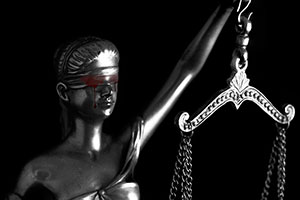The controversial conviction of Kristen Blaise Lobato for killing a homeless man in Las Vegas may eventually be overturned, thanks to expert evidence that strongly suggests her innocence. The Nevada Supreme Court recently ordered the trial court to decide whether Lobato’s lawyer failed to represent Lobato effectively by neglecting to offer expert evidence that could help prove her innocence.
Accusations Against Lobato
Lobato was convicted of murdering Duran Bailey. The homeless man was brutally maimed and beaten before his carotid artery was slashed. His body was discovered at 10:00 p.m. on July 8, 2001.
No physical evidence linked Lobato to the crime. No evidence suggested that Lobato knew Bailey. Lobato became a suspect only because the police heard an unconfirmed rumor that Lobato had admitted maiming a man in Las Vegas. Lobato’s addiction to methamphetamine may also have influenced prosecutors to view her as guilty.
When the police confronted Lobato, she explained that she had slashed at a man who tried to rape her. That incident occurred two months before Bailey was killed. Having no other suspect, the police decided she was lying and arrested her for killing Bailey.
Critics contend that the prosecution’s case “was built on a shoddy and incomplete police investigation that overlooked evidence strongly suggesting another suspect was responsible.” It was also built on very little forensic evidence.
Lobato’s Alibi
The prosecution conceded that Lobato was in Panaca, near the Utah border, most of the day on July 8. Although Panaca is three hours from Las Vegas, prosecutors insist that Lobato killed Bailey before dawn, or even the night of July 7, and then fled to Panaca.
To win a conviction, prosecutors made sure they did not narrow the window during which Panaca could have been killed. Unfortunately, neither did the defense attorney.
The Clark County medical examiner gave at least three different estimates of the time of Bailey’s death. The first estimate suggested that Bailey could have died at any point during the 24 hours prior to his death. At trial, the medical examiner testified that the victim died between 8 hours and 24 hours, and more likely between 12 and 18 hours, before his body was examined at 3:50 a.m. on July 9.
The medical examiner now concedes that Bailey’s likely time of death excludes the possibility that Lobato could have killed him. The defense presented no expert evidence to challenge the medical examiner’s broader estimates at trial. After Lobato was convicted, that failure became the basis for Lobato’s latest appeal.
Nevada Supreme Court Decision
While rejecting most of the claims that were raised on appeal, the Nevada Supreme Court noted that one had merit. Lobato’s postconviction lawyer argued that her trial lawyer should have retained a forensic pathologist or a forensic entomologist to narrow the time of the victim’s death. Doing so could have cemented Lobato’s alibi.
Lobato’s postconviction attorney presented the affidavits of three forensic entomologists who opined that the victim died after 8:00 p.m. on July 8. An affidavit from a forensic pathologist averred that the victim could not have been dead for more than a few hours when the victim’s body was discovered. Lobato’s uncontested alibi established that she was in Panaca, not Las Vegas, during that time frame.
The trial court did not grant Lobato a post-conviction hearing to establish whether her expert witnesses could have presented reliable evidence in support of her defense. The court discounted the affidavits because they had not been subjected to cross-examination, but as the Nevada Supreme Court noted, they were not subject to cross-examination because the trial court refused to allow a hearing during which the experts could testify and be cross-examined.
The Supreme Court held that the expert testimony, if admitted at trial, would have been sufficient to create a reasonable doubt about Lobato’s guilt. The court therefore remanded the case to the trial court to determine whether the trial attorney had a legitimate strategic reason for failing to investigate, and narrow down, the victim’s time of death. If the trial court agrees that trial counsel was ineffective, it will be required to grant Lobato a new trial.




